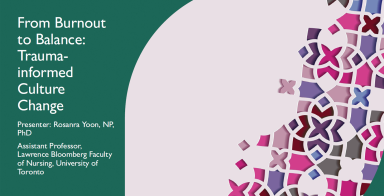Assisted living and supportive living needs assessment
The purpose is to understand workplace safety issues and examine the need for occupational health and safety training, education, and resources in assisted living and supportive living.
The purpose is to understand workplace safety issues and examine the need for occupational health and safety training, education, and resources in assisted living and supportive living.
Use expressive arts to identify and release inner blocks to well-being.
Webinar slides to Karen November's session on HeartMath.
Download the slide deck for Jennifer Roach's presentation: Designing for person-centered care
Understand the new WorkSafeBC legislation around the duty to cooperate and maintain employment for injured workers.
Emotional intelligence is our ability to identify and manage our own emotions and reactions - and includes our ability to identify and respond appropriately to the feelings of others.
This webinar will examine how a trauma-informed approach to organizational culture can help shift workplaces from reactive to responsive, enabling care workers to thrive while addressing their psychological and emotional needs.
Download the slide deck for John-Jose Nunez's presentation: How AI is shaping the future of mental health care
Rate setting and healthcare rates for 2022.
The slides for the Reimagining care work with trauma-informed approaches.
This presentation will guide you through the core components of self-compassion and explore the benefits of cultivating this practice.
Download the webinar's slides.
Download the slide deck for the webinar.
The slides for The burnout epidemic: Leading the shift to safety and wellbeing
A prsentation by Guillaume Tremblay, nurse practitioner
The slides for the Tools for managing stress and burnout webinar.
Slides for the Building a culture of communication to support neurodiverse voices
The slide deck for WorkSafeBC's webinar on the 2026 preliminary rates.


